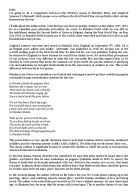A Commentary on 'A Mystic As Soldier' by Siegfried Sassoon
A Commentary on 'A Mystic As Soldier' by Siegfried Sassoon
Siegfried Sassoon was an English soldier and poet, decorated for his bravery in the First World War, and recognised as being an important poet of world war one. His poems often described the horrors he experienced in the trenches, or critiqued those behind a war he felt was pointless. He was born on September 8th, 1886, and died September the 1st, 1967.
The poem I chose was A Mystic As Soldier, and it seems to be Sassoon’s very personal reflection on the war, and more importantly, its affects on him. What I like most about this poem is how the poet uses his own personal experience from the war to illustrate the horrors of the First World War and how devastatingly it can affect someone. He first illustrates how his life was before becoming a soldier, setting it up as being very idyllic and peaceful. In the first stanza, he has an inner bliss in his solitude – here, he is the “mystic”. It gives this very esoteric feeling, and indeed, in the first stanza he is “dreaming fair songs for God”. There seems to be a unity within him, with himself and with “the absolute”. Sassoon only became very religious in the later part of his life, converting to Roman Catholicism after the Second World War. It seems here that in this line, Sassoon uses God as metaphor for his own inner harmony, and with that metaphor, elevates his inner peace to something almost transcendental. There is this glorification of his inner peace. In the third line, “glory” seems to both praise his god (his inner solace) and say that it is something beautiful.








